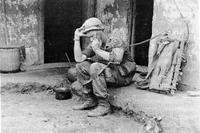Amy Palmer is the president and CEO of Soldiers' Angels, a national nonprofit that provides aid and comfort to the men and women of the United States Army, Marines, Navy, Air Force, Coast Guard, their families, and the growing veteran population.
Military caregivers are the unsung heroes of our military conflicts. On a daily basis, these caregivers -- more than 90% are women -- face isolation, stress, anxiety, exhaustion and other challenges that come with caring for a veteran dealing with visible and invisible scars.
Thankfully, many military and veteran nonprofits, such as Soldiers’ Angels and the Elizabeth Dole Foundation, in addition to the U.S. Department of Veterans Affairs, answer the call to support these caregivers and increase the quality of life for them and their families.
Yet, new studies and reports reveal that the need for support is even greater than once realized. A staggering 3.4 million military caregivers are simultaneously raising children. What’s worse, more than 50 percent of post-9/11 caregivers report that they do not have a support network to help with their caregiving. Sadly, it comes as almost no surprise that there has been an increase in reports of military spouse suicides.
While it is challenging enough to single-handedly care for children in addition to a wounded spouse, new research shows there is a ripple effect on children’s health and well-being caused by a parent’s military-related injuries. Health Affairs found that children in these families suffered negative changes on numerous metrics in the two years after a military injury, including more cases of maltreatment, more reported injuries and an increased number of psychiatric medication days. These families live far too close to a breaking point.
There is a crucial need for additional avenues of support for military caregivers, both for their sake and for the sake of their families. That is why we launched the Women of Valor program, which focuses on helping women who are post-9/11 military caregivers. The caregivers may be any female relative of the wounded hero. Our volunteers -- known as "Angels" for the value they provide across the nation -- offer support, encouragement and love to these caregivers.
Over the course of each year, every caregiver in the Women of Valor program receives personalized cards, letters, care packages and small gifts. Our Angel volunteers provide support throughout the year but, in many cases, friendships develop that could last a lifetime.
In addition to the personal connection, we provide educational and reference materials to the caregivers, selected by experts in the field. We want these incredible women to know that they have a team at their side during some of the most difficult times in their lives.
Diana, an Army veteran, military spouse and caregiver, is one of the Women of Valor. Her husband Brent was an Army veteran who supported both Operation Enduring Freedom and Operation Iraqi Freedom. Diana met Brent while they were both stationed at Fort Stewart in Georgia. When it came time to deploy, her husband was deployed to war and she was not.
After his service, in addition to suffering combat-related injuries, Brent dealt with severe and often debilitating post-traumatic stress. Almost overnight, Diana was thrust into the unimaginable role of becoming the full-time caregiver of her wounded husband while running the household and raising five children.
Diana registered in 2013 to receive support through the Soldiers’ Angels’ Women of Valor program. Connecting with a community of other caregivers experiencing the same trials and tribulations that she was experiencing was a huge source of support for Diana during some of her darkest times, and helped bring stability to her family.
Sadly, Brent passed away last year. To honor his life and legacy, a very talented Angel volunteer created a beautiful, hand-knit, American flag blanket, which was presented to the family.
In a letter, Diana and her family say the blanket is “still a centerpiece of comfort in our living room in our new house. The children use it as a comfort item when needed to wrap themselves in 'Daddy’s flag.' It is a constant reminder of the legacy he left behind: Be charitable, help others, be kind, be honest. These are things he left instilled in us, even as he forgot these things himself. He will always be remembered as our Hero.”
There are millions of women like Diana across our country. They seek to maintain a life of hope and optimism, while they tirelessly care for their spouses and family in the face of immense adversity.
Just like their military spouses who served, these caregivers deserve our nation’s unending gratitude and support.















